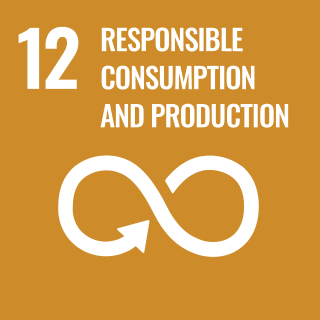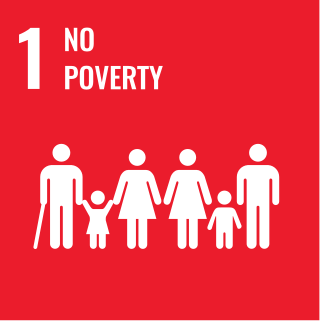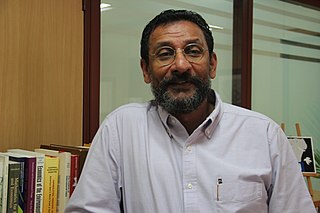Related Research Articles

Sustainable development is an organizing principle that aims to meet human development goals while also enabling natural systems to provide necessary natural resources and ecosystem services to humans. The desired result is a society where living conditions and resources meet human needs without undermining the planetary integrity and stability of the natural system. Sustainable development tries to find a balance between economic development, environmental protection, and social well-being. The Brundtland Report in 1987 defined sustainable development as "development that meets the needs of the present generation without compromising the ability of future generations to meet their own needs". The concept of sustainable development nowadays has a focus on economic development, social development and environmental protection for future generations.

An ecovillage is a traditional or intentional community with the goal of becoming more socially, culturally, economically, and/or ecologically sustainable. An ecovillage strives to produce the least possible negative impact on the natural environment through intentional physical design and resident behavior choices. It is consciously designed through locally owned, participatory processes to regenerate and restore its social and natural environments. Most range from a population of 50 to 250 individuals, although some are smaller, and traditional ecovillages are often much larger. Larger ecovillages often exist as networks of smaller sub-communities. Some ecovillages have grown through like-minded individuals, families, or other small groups—who are not members, at least at the outset—settling on the ecovillage's periphery and participating de facto in the community. There are currently more than 10,000 ecovillages around the world.
The Global Ecovillage Network (GEN) is a global association of people and communities (ecovillages) dedicated to living "sustainable plus" lives by restoring the land and adding more to the environment than is taken. Network members share ideas and information, transfer technologies and develop cultural and educational exchanges.

Bafut is a town located in a modern commune in Cameroon, it is also a traditional fondom. It is located in the Mezam Department, which in turn is located in the Northwest Province.
International education refers to a dynamic concept that involves a journey or movement of people, minds, or ideas across political and cultural frontiers. It is facilitated by the globalization phenomenon, which increasingly erases the constraints of geography on economic, social, and cultural arrangements. The concept involves a broad range of learning, for example, formal education and informal learning. It could also involve a reorientation of academic outlook such as the pursuit of "worldmindedness" as a goal so that a school or its academic focus is considered international. For example, the National Association of State Universities prescribes the adoption of "proper education" that reflects the full range of international, social, political, cultural, and economic dialogue. International educators are responsible for "designing, managing, and facilitating programs and activities that help participants to appropriately, effectively, and ethically engage in interactions with culturally diverse people and ideas."

The Decade of Education for Sustainable Development (DESD) 2005–2014 was an Education for Sustainable Development (ESD) initiative of the United Nations. The Decade was delivered by UNESCO as lead agency, and gave rise to Regional Centres of Expertise (RCE) networks, and the GUPES universities' partnership. The launch of the United Nations Decade of Education for Sustainable Development started a global movement to reorient education to address the challenges of sustainable development. It was the first UN Decade to establish a global monitoring and evaluation process and expert group. Building on the achievement of the Decade, stated in the Aichi-Nagoya Declaration on ESD, UNESCO endorsed the Global Action Programme on ESD (GAP) in the 37th session of its General Conference. Acknowledged by UN general assembly Resolution A/RES/69/211 and launched at the UNESCO World Conference on ESD in 2014, the GAP aims to scale-up actions and good practices. UNESCO has a major role, along with its partners, in bringing about key achievements to ensure the principles of ESD are promoted through formal, non-formal and informal education.

The 2030 Agenda for Sustainable Development, adopted by all United Nations members in 2015, created 17 world Sustainable Development Goals (SDGs). They were created with the aim of "peace and prosperity for people and the planet..." – while tackling climate change and working to preserve oceans and forests. The SDGs emphasize the interconnected environmental, social and economic aspects of sustainable development by putting sustainability at their center.

Climate change education (CCE) is education that aims to address and develop effective responses to climate change. It helps learners understand the causes and consequences of climate change, prepares them to live with the impacts of climate change and empowers learners to take appropriate actions to adopt more sustainable lifestyles. Climate change and climate change education are global challenges that can be anchored in the curriculum in order to provide local learning and widen up mindset shits on how climate change can be mitigated. In such as case CCE is more than climate change literacy but understanding ways of dealing with climate
The Worldwide Institute of Sustainable Development Planners (WISDP) was formed in October 2017 by a group of academics and professionals to further the UN Agenda 2030 and the United Nations' 17 Sustainable Development Goals It is supported by the UNESCO Hong Kong Association and the Hong Kong Institute of Education for Sustainable Development.

Sustainable Development Goal 16 is one of the 17 Sustainable Development Goals established by the United Nations in 2015, the official wording is: "Promote peaceful and inclusive societies for sustainable development, provide access to justice for all and build effective, accountable and inclusive institutions at all levels". The Goal has 12 targets and 23 indicators.

James Thomas Ross Jackson is a Danish-Canadian economist, author and philanthropist born in Ottawa, Canada in 1938. In 1971, J.T. Ross Jackson co-founded SimCorp A/S: one of the world's first financial engineering companies. Later, Jackson began focusing more on international finance, consulting around the world in investment strategies for banks, insurance companies, and mutual fund providers. This led J.T. Ross Jackson to research currency trading methods and the creation of various investment strategies.

Sustainable Development Goal 13 is to limit and adapt to climate change. It is one of 17 Sustainable Development Goals established by the United Nations General Assembly in 2015. The official mission statement of this goal is to "Take urgent action to combat climate change and its impacts". SDG 13 and SDG 7 on clean energy are closely related and complementary.

Sustainable Development Goal 12, titled "responsible consumption and production", is one of the 17 Sustainable Development Goals established by the United Nations in 2015. The official wording of SDG 12 is "Ensure sustainable consumption and production patterns". SDG 12 is meant to ensure good use of resources, improve energy efficiency and sustainable infrastructure, provide access to basic services, create green and decent jobs, and ensure a better quality of life for all. SDG 12 has 11 targets to be achieved by at least 2030, and progress towards the targets is measured using 13 indicators.

Sustainable Development Goal 11, titled "sustainable cities and communities", is one of 17 Sustainable Development Goals established by the United Nations General Assembly in 2015. The official mission of SDG 11 is to "Make cities inclusive, safe, resilient and sustainable". The 17 SDGs take into account that action in one area will affect outcomes in other areas as well, and that development must balance social, economic and environmental sustainability.

Sustainable Development Goal 4 is about quality education and is among the 17 Sustainable Development Goals established by the United Nations in September 2015. The full title of SDG 4 is "Ensure inclusive and equitable quality education and promote lifelong learning opportunities for all".

Sustainable Development Goal 1, one of the 17 Sustainable Development Goals established by the United Nations in 2015, calls for the end of poverty in all forms. The official wording is: "No Poverty". Member countries have pledged to "Leave No One Behind": underlying the goal is a "powerful commitment to leave no one behind and to reach those farthest behind first".

Global Goals Week is a shared commitment between a coalition of over 160 partners across all industries, which mobilizes annually in September to bring together communities, demand urgency, and supercharge solutions for the Sustainable Development Goals (SDGs). It was founded in 2016 by the United Nations Foundation, Project Everyone, and the United Nations Development Programme (UNDP). It is timed to coincide with the UN General Assembly "High-Level Week" in New York. The week includes events, summits, conferences, forums, workshops, pledges, and other activations in New York, around the world, and online. It usually runs alongside Climate Week NYC, the annual conference of Goalkeepers, Bloomberg Global Business Forum and many other high-level events.

Sustainable Development Goals and Nigeria is about how Nigeria is implementing the Sustainable Development Goals within the thirty-six states and its Federal Capital Territory (FCT). The Sustainable Development Goals (SDGs) consist of seventeen global goals designed as a "blueprint to achieve a better and more sustainable future for all". Each of the 17 goals is expected to be achieved by 2030 in every country around the world.
Sustainable Development Goals and Lebanon explains major contributions launched in Lebanon towards the advancement of the Sustainable Development Goals SDGs and the 2030 agenda.

Anantha Duraiappah has served as the inaugural director of the Mahatma Gandhi Institute of Education for Peace and Sustainable Development (MGIEP), a UNESCO Category 1 Research Institute in the Asia Pacific since 2014. He is also currently visiting professor in the Urban Institute at the Kyushu University, Japan, former visiting professor, University of Tokyo, Japan, a fellow of The World Academy of Sciences (TWAS), a fellow and member, World Academy of Arts and Sciences and a member of the advisory board, Journal - Indian Society of Ecological Economics. He has previously worked in senior positions at the United Nations University, United Nations Environment Progamme, International Institute for Sustainable Development and was previously an academic at Vrije Universiteit, National University of Singapore and European University Institute. Dr. Duraiappah is also formally trained in the modern Japanese martial art of Kendo.
References
- ↑ "Climate change and SDG education to target million youths". University World News. Retrieved 2024-03-24.
- ↑ Resilience (2018-07-18). "Integrated Sustainable Community & Ecovillage Design Education". resilience. Retrieved 2024-03-24.
- ↑ "Renewable Energies for Sustainable Development online programme | Department of Economic and Social Affairs". sdgs.un.org. Retrieved 2024-03-23.
- ↑ "Gaia Education – 2022 Outstanding Peace Education — Luxembourg Peace Prize" . Retrieved 2024-03-23.
- ↑ "Sustainable food project gives vulnerable migrant women a new start". UNESCO.
- ↑ Wahl, Daniel (2016-05-16). Designing Regenerative Cultures. Triarchy Press. ISBN 978-1-909470-78-1.